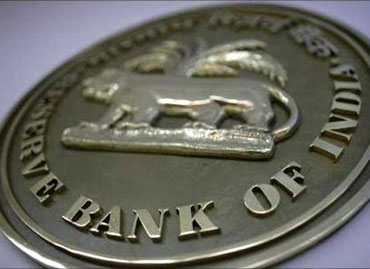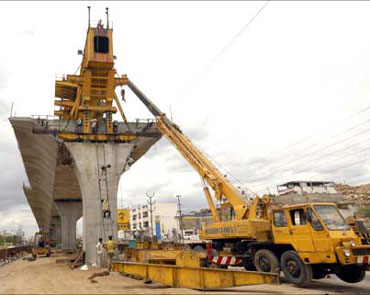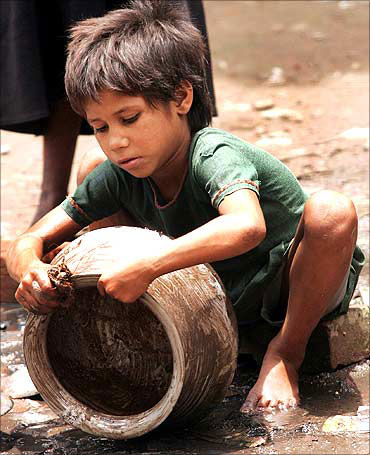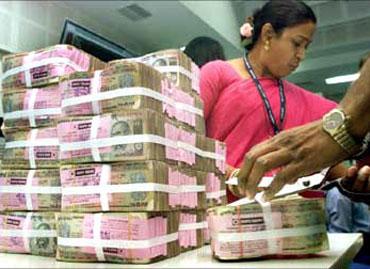 | « Back to article | Print this article |
UPA-II: Debate moves to infrastructure
The nature of debates that engage ministers and bureaucrats in different Bhavans on and around New Delhi's Raisina Hill is a usually reliable indicator of the Union government's policy priorities and concerns.
If we use this yardstick, it would appear that in its second term, the United Progressive Alliance government has seen a perceptible shift in the nature of such policy debates.
A quick review of what is currently engaging the attention of ministers and bureaucrats in different central ministries, therefore, will be useful. For the last several months, North Block, which houses the finance ministry headquarters, has been busy with the goods and services tax (GST) and the direct taxes code.
The two major tax reforms will bring about as fundamental a change in the country's taxation structure as was seen in the first phase of reforms in the 1990s.
Successive governments in that decade had reduced and simplified the customs duty, introduced the service tax, moved towards a central value-added tax system and cut the direct tax rates to reasonably low levels for both individuals and companies.
The debate during those days had a different tinge to it. Domestic industry was wary of the impact of the lowering of the import tariff barrier and Left critics were worried that the sharp cut in duties and taxes would fail to trigger higher compliance and increased revenue buoyancy. In the end, it turned out that these fears were completely misplaced.
Click NEXT to read on . . .
UPA-II: Debate moves to infrastructure
The current discussion over GST and the new direct taxes code has none of that shrillness. Industry, in general, is happy that the government is moving ahead with these changes.
If they have some concerns, these are over the need to make the new system more simple, uniform and foolproof. Taking the place of industry as sharp critics of the new system are new players like the state governments and even some central ministries.
States, particularly those ruled by the Bharatiya Janata Party, are opposed to the idea of losing their fiscal autonomy of fixing a state-level GST rate of their choice.
They are not happy with the proposal that the Centre will enjoy the veto power in the council of finance ministers, which would settle all disputes over the implementation of the GST system. They are also demanding higher compensation for the revenues they might lose after the implementation of the new system.
Note that these are disputes among governments. Industry and consumers are quiet bystanders, who hope that the new system would be in place soon enough making their life more simple and businesses more efficient.
The surprise is that the real opposition to the new direct taxes code has come from within the Union government. The commerce ministry, which had introduced the scheme of special economic zones with statutory backing in 2005, is upset that the direct taxes code may take away the tax incentives granted to the units set up under these zones.
Click NEXT to read on . . .
UPA-II: Debate moves to infrastructure
A major debate is now going on within the government over the extent to which the finance ministry can tweak the new code to retain or modify these incentives.
Another change in the nature of debates in UPA-II is that they are no longer restricted to the formulation of fiscal policies. Instead, they are now spread over other areas.
Roads, Highways and Surface Transport Minister Kamal Nath is upset with the Planning Commission, which has come out with a study that found that the ministry's business model for building roads is financially unviable.
The debate between Kamal Nath's ministry and Yojana Bhavan has reached a level where the minister described the Planning Commission as a body of armchair advisors.
Not just the home minister's strategy to tackle Left-wing extremism in large parts of the country is now under attack from within the Congress, there is also greater scrutiny of the government's plan to legislate the people's right to food.
Click NEXT to read on . . .
UPA-II: Debate moves to infrastructure
Don't forget that the right to food is being framed under the supervision of the National Advisory Council, which has activists like Jean Dreze and Aruna Roy as members and Congress president Sonia Gandh as its chairperson.
Yet, non-government organisations outside NAC have mounted a major move against the right to food, arguing that the quantity of food assured under the law is inadequate and that the law should guarantee not just availability of foodgrains but also pulses and vegetables (food security cannot be delinked from nutritional security!).
A fresh debate may surface when the human resources development ministry allows the entry of foreign universities. Already, the proposal to allocate 26 per cent of equity in mining companies to tribal people, who lose their land to such projects, is a subject of heated debate among various departments within the government.
Similarly, the civil aviation ministry is unhappy with the environment and forests ministry's strict enforcement of laws that do not permit the construction of a new airport that would destroy mangroves and cause other ecological problems.
The point you cannot miss is that the debates in UPA-II are no longer only about economic or fiscal policies. They are more about infrastructure, internal security, education, land rights for tribal people, environmental concerns over industrial projects and the right to food security.




